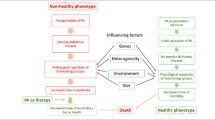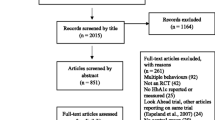Abstract
Purpose
To establish the effect of a long-term multicomponent exercise (LTMEX) intervention (24 months) on health-related quality of life (HRQoL), in older adults with type 2 diabetes (T2D).
Methods
This longitudinal retrospective cohort study analyzes the effects of a supervised LTMEX program on HRQoL in older adults with T2D (n = 279). Participants underwent one of two conditions: LTMEX (n = 241) trained three times per week; and unchanged lifestyle—the control group (CO; n = 38). Participants completed baseline, and 2-year follow-up evaluations including the Short Form Health Survey 36 (SF-36), anthropometric, hemodynamic components, and cardiorespiratory fitness (VO2 peak).
Results
LTMEX improves HRQoL, specifically physical functioning (P < 0.001), general health (P < 0.05), vitality (P < 0.001), mental health (MH; P < 0.05), physical component score (P < 0.001), mental component score (P < 0.001), and total SF-36 (P < 0.001). LTMEX group also decreased body weight (BW; P < 0.005), waist circumference (WC; P < 0.001), waist-to-hip ratio (WHR; P < 0.001), and systolic blood pressure (SBP; P < 0.001), and increased VO2 peak (P < 0.001). CO group increased WC (P = 0.012), BMI (P = 0.024), waist-to-hip ratio (WHR; P = 0.003) and SBP (P < 0.001), and decreased vitality (P < 0.001) and MH (P < 0.05).
Conclusions
A LTMEX intervention improves physical and mental HRQoL in older adults with T2D, and also anthropometric, hemodynamic profile, and cardiorespiratory fitness.

Similar content being viewed by others
References
American Diabetes Association (2016). Standards of medical care in diabetes—2016. Diabetes Care, 35(6), 386–390. doi:10.2337/dc14-S014.
Aschner, P., Beck-Nielsen, H., Bennett, P., Boulton, A., Colagiuri, R., Colagiuri, S., et al. (2014). Global guideline for type 2 diabetes. Diabetes Research and Clinical Practice, 104(1), 1–52.
Colberg, S., Sigal, R., Fernhall, B., Regensteiner, J., Blissmer, B., Rubin, R., et al. (2010). Exercise and type 2 diabetes: The American college of sports medicine and the American diabetes association: joint position statement. Diabetes Care, 33, e147–e167.
Hayeck, A. A., Robert, A. A., Saeed, A. A., Alzaid, A. A., & Sabaan, F. S. (2014). Factors associated with health related quality of life among Saudi patients with type 2 diabetes mellitus: a cross-sectional survey. Diabetes & Metabolism Journal, 38, 220–229.
Kirkman, M. S., Briscoe, V. J., Clark, N., Florez, H., Haas, L., Halter, J., et al. (2012). Diabetes in older adults. Diabetes Care, 35, 2650–2664.
Papadopoulos, A., Kontodimopoulos, N., Frydas, A., Ikonomakis, E., & Niakas, D. (2007). Predictors of health-related quality of life in type II diabetic patients in Greece. BMC Public Health, 7, 186. doi:10.1186/1471-2458-7-186.
Speight, J., Reaney, M., & Barnard, K. (2009). Not all roads lead to Rome: A review of quality of life measurement in adults with diabetes. Diabetic Medicine, 26, 315–327.
Myers, V. H., McVay, M. A., Brashear, M. M., Johannsen, N. M., Swift, D., Kramer, K., et al. (2013). Exercise training and quality of life in individuals with type 2 diabetes: A randomized controlled trial. Diabetes Care, 36, 1884–1890.
Wee, H., Cheung, Y., Li, S., Fong, K., & Thumboo, J. (2005). The impact of diabetes mellitus and other chronic medical conditions on health-related quality of life: Is the whole greater than the sum of its parts? Health Quality Life Outcomes, 3, 2.
Javanbakht, M., Abolhasani, F., Mashayekhi, A., Baradaran, H. & Jahangirinoudeh, Y. (2012). Health related quality of life in patients with type 2 diabetes mellitus in Iran: A national survey. Plos One, 7(8), e44526–e44532.
Maddigan, S. L., Feeny, D. H., Majumdar, S. R., Farris, K. B., & Johnson, J. A. (2006). Understanding the determinants of health for people with type 2 diabetes. American Journal Public Health, 96(6), 1649–1655.
Imayama, I., Alfano, C. M., Cadmus Bertram, L. A., Wang, C., Xiao, L., Duggan, C., et al. (2011). Effects of 12-month exercise on health-related quality of life: A randomized controlled trial. Preventive Medicine, 52(5), 344–351.
Bize, R., Johnson, J. A., & Plotnikoff, R. C. (2007). Physical activity level and health-related quality of life in the general adult population: A systematic review. Preventive Medicine, 45(6), 401–415.
Dondzila, C., Gennuso, K. P., Swartz, A. M., Tarima, S., Lenz, E. K., Stein, S. S., et al. (2015). Dose-response walking activity and physical function in older adults. Journal Aging Physical Activity, 23(2), 194–199.
Kelley, G. A., Kelley, K. S., Hootman, J. M., & Jones, D. L. (2009). Exercise and health-related quality of life in older community- dwelling adults: A meta-analysis of randomized controlled trials. Journal Applied Gerontology, 28, 369–394.
Lincoln, A. K., Shepherd, A., Johnson, P. L., & Castaneda-Sceppa, C. (2011). The impact of resistance exercise training on the mental health of older Puerto Rican adults with type 2 diabetes. Journals Gerontology Serie B: Psychological Sciences Social Sciences, 66, 567–570.
Lambers, S., Van Laethem, C., Van Acker, K., & Calders, P. (2008). Influence of combined exercise training on indices of obesity, diabetes and cardiovascular risk in type 2 diabetes patients. Clinical Rehabilitation, 22, 483–492.
Rubin, R. R., Wadden, T. A., Bahnson, J. L., Blackburn, G. L., Brancati, F. L., Bray, G. A., et al. (2014). Impact of an intensive lifestyle intervention on depression and health related quality of life in type 2 diabetes: the look AHEAD study. Diabetes care, 37, 1544–1553.
Nicolucci, A., Balducci, S., Cardelli, P., Cavallo, S., Fallucca, S., Bazuro, S., … Italian Diabetes Exercise Study Investigators. (2012). Relationship of exercise volume to improvements of quality of life with supervised exercise training in patients with type 2 diabetes in a randomized controlled trial: the Italian Diabetes and Exercise Study (IDES). Diabetologia, 55, 579–588.
Reid, R. D., Tulloch, H. E., Sigal, R. J., Kenny, G. P., Fortier, M., McDonnell, L., et al. (2010). Effects of aerobic exercise, resistance exercise or both, on patient-reported health status and well-being in type 2 diabetes mellitus: A randomized trial. Diabetologia, 53, 632–640.
Dale, C. E., Bowling, A., Adamson, A., Kuper, H., Amazu, A., Ebrahim, S., et al. (2013). Predictors of patterns of change in health related quality of life in older women over 7 years: Evidence from a prospective cohort study. Age and Ageing, 48, 312–318.
O´Hagan, C., De Vito, G., & Boreham, C. (2013). Exercise prescription in the treatment of type 2 diabetes melittus: Current practices, existing guidelines and future directions. Sports Medicine, 43, 39–49.
Marwick, T., Hordern, M., Miller, T., Chyun, D. A., Bertoni, A. G., Blumenthal, R. S., et al. (2009). Exercise training for type 2 diabetes mellitus: Impact on cardiovascular risk: A scientific statement from the American Heart Association. Circulation, 119, 3244–3262.
Cruz-Jentoft, A. J., Carpena-Ruiz, M., Monero-Errasquín, B., Sánchez-Castellano, C., & Sánchez-García, E. (2013). Exclusion of older adults from ongoing clinical trials about type 2 diabetes mellitus. Journal American Geriatric Society, 61(5), 734–738.
Rikli, R. E., & Jones, C. J. (1999). Development and validation of a functional fitness test for community-residing older adults. Journal Aging Physical Activity, 7, 129–161.
American College of Sports Medicine. (2014). ACSM’s guidelines for exercise testing and prescription, 8th Edn. Baltimore, MD: Lippincott Williams & Wilkins.
Ferreira, P. (1998). A medição do estado de saúde: criação da versão portuguesa do MOS SF-36, in Centro de Estudos e Investigação em Saúde, Faculdade de Economia. Coimbra: Universidade de Coimbra.
Ware, J. E., Snow, K. K., Kosinski, M., & Gandek, B. (1993). SF-36 health survey: Manual and interpretation guide. Lincoln: Quality Metric Inc.
Borg, G. (1988). Perceived exertion and pain scales. Champaign, IL: Human Kinetics.
Cohen, J. (1988). Statistical power analysis for the behavioural sciences. New York: Academic Press.
Hedges, L. V., & Olkin, I. (1985). Statistical methods for meta-analysis. New York: Academic Press.
Crosby, R. D., Kolotkin, R. L., & Williams, G. R. (2003). Defining clinically meaningful change in health-related quality of life. Journal Clinical Epidemiology, 56, 395–407. doi:10.1016/S0895-4356(03)00044-1.
Snowling, N., & Hopkins, W. (2006). Effects of different modes of exercise training on glucose control and risk factors for complications in type 2 diabetic patients: A meta-analysis. Diabetes Care, 29, 2518–2527.
Li, C., Chen, S., Lan, C., Pan, W., Chou, H., Bai, Y., et al. (2011). The effects of physical activity, body mass index (BMI) and waist circumference (WC) on glucose intolerance in older people: A nationwide study from Taiwan. Archives Gerontology Geriatrics, 52, 54–59.
Gaterer, H., Ulmer, H., Dzien, A., Somavilla, M., & Burtscher, M. (2011). High cardiorespiratory fitness is more beneficial in pre-diabetic men than women. Clinics (Sao Paulo, Brazil), 66(5), 747–751.
Chae, J., Kang, R., Kwak, J., Paik, J. K., Kim, O. Y., Kim, M., et al. (2012). Supervised exercise program, BMI, and risk of type 2 diabetes in subjects with normal or impaired fasting glucose. Diabetes Care, 35(8), 1680–1685.
Colberg, S., & Grieco, C. (2009). Exercise in the treatment and prevention of diabetes. Current Sports Medicine Reports, 8(4), 169–175.
Taylor, L., Spence, J., Plotnikoff, R., Vallance, J., & Sharma, A. (2010). Physical activity and health-related quality of life in individuals with prediabetes. Diabetes Research Clinical Practice, 90(1), 15–21.
Praet, S., & Von Lon, L. (2008). Exercise: the brittle cornerstone of type 2 diabetes treatment. Diabetologia, 51, 398–401.
Madden, S., Loeb, S., & Smith, C. (2008). An integrative literature review of lifestyle interventions for the prevention of type II diabetes mellitus. Journal Clinical Nursing, 17, 2243–2256.
Kueh, Y.C., Morris, T., Borkoles, E. & Shee, H. (2015). Modelling of diabetes knowledge, attitudes, self-management and, quality of life: A cross-sectional study with an Australian sample. Health Quality Life Outcomes, 13, 129–140.
Acknowledgements
The authors are grateful to all medical interns of Santa Maria da Feira for their technical support, especially to Doctor Nunes Sousa and Macedo Coelho, to Santa Maria da Feira Council with a special greeting to Social Division, to Dra. Manuela Coelho and Francisco Rocha for the disposable and availability to the study prosecution in the community exercise program “Movimento e bem-estar”; to all physical education professionals in the exercise program, and finally, we also thank all the participants who gave literally their physical and mental contributions.
Authors contributions
L. C. B. contributed to the study concept and design, acquisition of data, critical revisions of the manuscript for important intellectual content, and administrative, technical, and material support; analyzed and interpreted data; drafted the manuscript. G.D. and N.R.S. contributed to the acquisition of data, critical revisions of the manuscript for important intellectual content. M.T.V contributed critical revisions of the manuscript for important intellectual content. R.A.M. contributed to the study concept and design, contributed with critical revisions of the manuscript for important intellectual content, analyzed and interpreted the data, drafted the manuscript, and conducted the statistical analysis and study supervision. L.C.B. is guarantor of this work and, as such, had full access to all data in the study and takes responsibility for the integrity of the data and the accuracy of the data analysis.
Funding
This study was funded by a Portuguese grant from Portuguese Science and Technology Foundation (SFRH/BD/90221/2012).
Author information
Authors and Affiliations
Corresponding author
Ethics declarations
Conflict of interest
No potential conflicts of interest relevant to this article were reported.
Rights and permissions
About this article
Cite this article
Baptista, L.C., Dias, G., Souza, N.R. et al. Effects of long-term multicomponent exercise on health-related quality of life in older adults with type 2 diabetes: evidence from a cohort study. Qual Life Res 26, 2117–2127 (2017). https://doi.org/10.1007/s11136-017-1543-3
Accepted:
Published:
Issue Date:
DOI: https://doi.org/10.1007/s11136-017-1543-3




